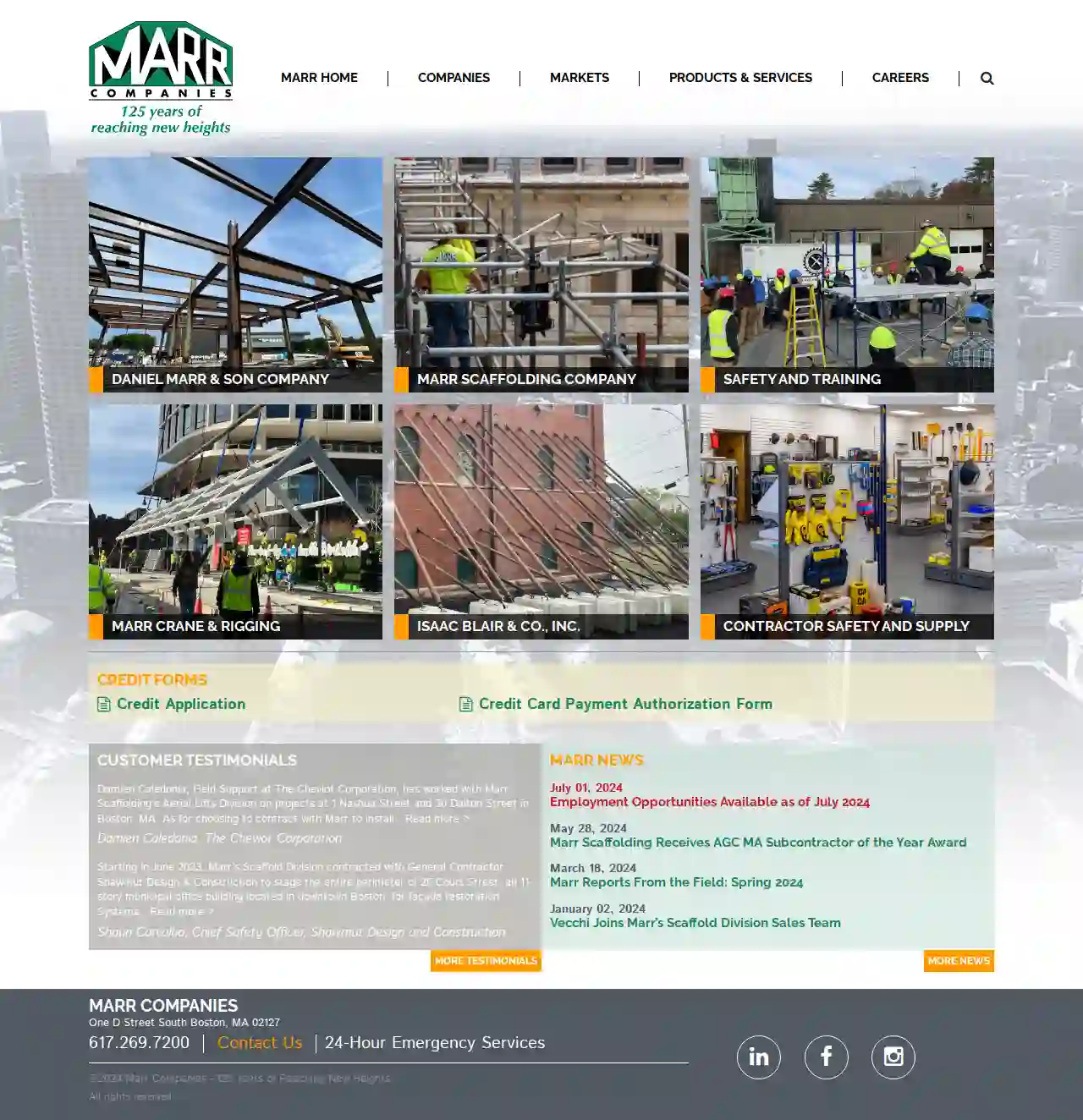Scaffolding Companies Richmond
Top Scaffolding Builders in Richmond
Receive multiple Scaffolding Experts quotes for your project today! Compare profiles, reviews, accreditations, portfolio, etc... and choose the best deal.

Marr Scaffolding Company - Providence
44 reviewsOne D Street South Boston, MA, Boston, 02127, USMarr Companies: A Legacy of Excellence For over 125 years, Marr Companies has been a trusted leader in the construction industry, providing a wide range of services and products to meet the needs of our clients. Our commitment to safety, quality, and customer satisfaction has earned us a reputation for excellence throughout the region. Our Mission Our mission is to provide our clients with the highest quality construction services and products, delivered safely and efficiently. We strive to build lasting relationships with our clients, based on trust, respect, and a shared commitment to excellence. Our Values Our values guide everything we do. We are committed to: Safety First Quality Workmanship Customer Satisfaction Integrity and Ethics Teamwork and Collaboration Our Experience Our team of experienced professionals has a deep understanding of the construction industry and a proven track record of success. We are committed to providing our clients with the best possible service and support, from the initial planning stages to the final completion of the project.
- Services
- Why Us?
- Gallery
Get Quote
Atlas Scaffolding & Equipment
51 reviewsWarwick, RI, 80 Gilbane Street, 02886, USAtlas Scaffolding & Equipment is a full-service scaffolding, shoring, and trash chute equipment rentals, sales, installation, and dismantling services company. Established in 1997, they cater to contractors, municipalities, and industrial customers throughout Rhode Island, Southeastern Massachusetts, and parts of Connecticut. Their main facility is located at 80 Gilbane Street, Warwick, RI. Known for their excellent safety record, quick and responsive service, free estimates, full insurance, strict OSHA compliance, and membership in the SIA, Atlas Scaffolding is a trusted name in the industry.
- Services
- Why Us?
- Accreditations
- Our Team
- Testimonials
- Gallery
Get Quote- Ne
Newport Builders' Supply Co
Providence, US- Services
- Why Us?
Get Quote
Over 2,353+ Scaffolding Companies onboarded
Our scaffolding companies operate in Richmond & surroundings!
ScaffoldingHQ has curated and vetted the Best Scaffolding Businesses arround Richmond. Find a reliable contractor today.
Frequently Asked Questions About Scaffolding Companies
- Workers: Consider the number of workers on the scaffolding at any given time.
- Materials: Include the weight of building materials, tools, and equipment being used on the platform.
- Environmental Factors: Factor in potential loads from wind or snow, especially for taller scaffolding structures.
- Project Height and Access: The height of the structure and the accessibility of the working area are primary considerations.
- Load Capacity: The weight of workers, materials, and equipment that the scaffolding needs to support.
- Project Complexity and Shape: The shape and complexity of the structure may necessitate specialized scaffolding configurations.
- Ground Conditions: The type of ground (soft, uneven, sloping) will influence the scaffolding foundation and support requirements.
- Duration of Use: The length of time the scaffolding will be needed can impact the choice of system.
- Budget: Different scaffolding types have varying costs.
- Encroaches onto public property (sidewalks, roads): Permits are usually needed from the local council or highway authority.
- Exceeds a certain height: Scaffolding above a specified height often requires a permit.
- Is erected in a conservation area or near a listed building: Special considerations and permits may apply.
What is the weight limit for scaffolding?
What is a scaffolding hoist?
How do I choose the right type of scaffolding for my project?
Do I need a permit for scaffolding in the USA?
What is the weight limit for scaffolding?
- Workers: Consider the number of workers on the scaffolding at any given time.
- Materials: Include the weight of building materials, tools, and equipment being used on the platform.
- Environmental Factors: Factor in potential loads from wind or snow, especially for taller scaffolding structures.
What is a scaffolding hoist?
How do I choose the right type of scaffolding for my project?
- Project Height and Access: The height of the structure and the accessibility of the working area are primary considerations.
- Load Capacity: The weight of workers, materials, and equipment that the scaffolding needs to support.
- Project Complexity and Shape: The shape and complexity of the structure may necessitate specialized scaffolding configurations.
- Ground Conditions: The type of ground (soft, uneven, sloping) will influence the scaffolding foundation and support requirements.
- Duration of Use: The length of time the scaffolding will be needed can impact the choice of system.
- Budget: Different scaffolding types have varying costs.
Do I need a permit for scaffolding in the USA?
- Encroaches onto public property (sidewalks, roads): Permits are usually needed from the local council or highway authority.
- Exceeds a certain height: Scaffolding above a specified height often requires a permit.
- Is erected in a conservation area or near a listed building: Special considerations and permits may apply.